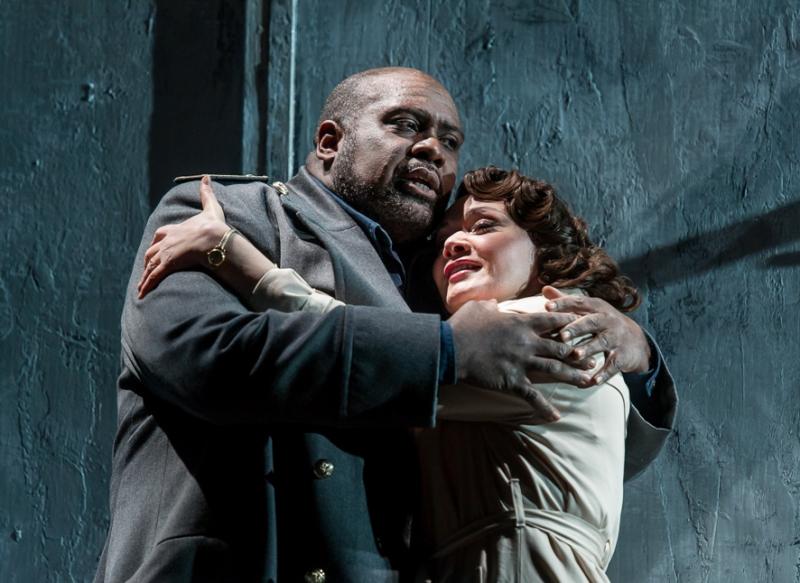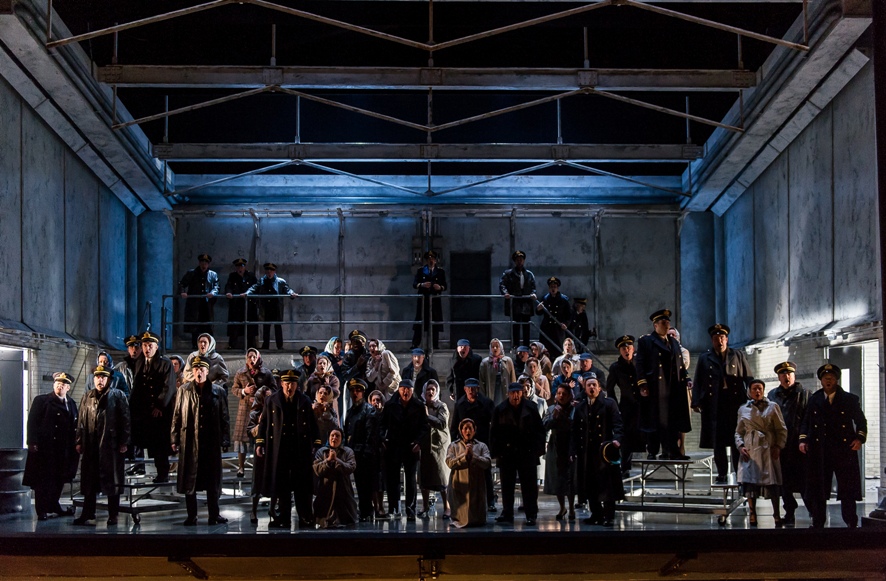Otello, Opera North | reviews, news & interviews
Otello, Opera North
Otello, Opera North
Verdi's epic chamber piece overpowers after gloomy opening

The overpowering nastiness of Shakespeare’s source material is offset by Verdi’s sublime, impeccably judged music; this is a wonderful opera with barely a dud moment. Trust the score, get decent singers and an understanding, intelligent conductor, and everything should be fine.
The one rocky moment in Opera North’s new production of Otello comes in the opening minutes; Verdi’s storm-tossed prelude blasts out gloriously, the huge ensemble cast enter and stare boldly out into the auditorium. And yet, when the solo singing starts it’s almost impossible to ascertain where the individual voices are coming from. It’s as if the set’s been carefully, moodily illuminated, but with little consideration given to the characters populating it. Leslie Travers’ battleship-grey, Cold War era designs are an ideal physical reflection of the paranoia and mistrust at the heart of Shakespeare’s text, but you start to crave a little more colour. Happily, things improve rapidly - the lighting enhancing the action rather than working against it.
 For all the opera’s grandeur, its epic scale, Otello is at heart a chamber piece, its success ultimately reliant on the casting of the three leads. Ronald Samm’s Otello is a brooding, belligerent stage presence whose ability to stay one step behind everyone else is both endearing and tragic. His thunder is continually stolen by David Kempster’s manipulative Iago. Kempster’s portrayal is all sly, strutting petulance. This is a man who loves the power and status that uniform and rank bring. He also looks as if he’s gone to seed – there’s a hint of a paunch, a slightly ridiculous moustache. This is an officer who’s not been promoted for good reason. But he‘s a brilliantly insidious bully – able to undermine, unnerve with the slightest of comments. Elena Kelessedi as Desdemona acts convincingly, but there’s an occasional hint of harshness to her tone in the early scenes. She does come into her own in the final act, the Willow Song packing a punch, though her sudden, temporary revival after her suffocation by Otello caused involuntary audience giggles.
For all the opera’s grandeur, its epic scale, Otello is at heart a chamber piece, its success ultimately reliant on the casting of the three leads. Ronald Samm’s Otello is a brooding, belligerent stage presence whose ability to stay one step behind everyone else is both endearing and tragic. His thunder is continually stolen by David Kempster’s manipulative Iago. Kempster’s portrayal is all sly, strutting petulance. This is a man who loves the power and status that uniform and rank bring. He also looks as if he’s gone to seed – there’s a hint of a paunch, a slightly ridiculous moustache. This is an officer who’s not been promoted for good reason. But he‘s a brilliantly insidious bully – able to undermine, unnerve with the slightest of comments. Elena Kelessedi as Desdemona acts convincingly, but there’s an occasional hint of harshness to her tone in the early scenes. She does come into her own in the final act, the Willow Song packing a punch, though her sudden, temporary revival after her suffocation by Otello caused involuntary audience giggles.
Director Tim Albery always excels when he’s dealing with large forces. Here, chorus and minor roles always look convincing, the actions always look credible. The opening scene’s fight between Cassio (Michael Wade Lee, excellent), Roderigo and Montano is beautifully well-handled – singers jumping fearlessly on and off tables, the crowd of onlookers swarming around with believable fluidity. Even Albery can’t prevent the kitschy interlude involving mandolins and childrens’ chorus from appearing unnecessarily saccharine, but it does provide a smidgeon of light relief. He’s excellent at ratching up the tension as the opera nears its close, the set growing darker, more enclosed and increasingly claustrophobic. It’s a sign of a gripping production that in the final scene part of you wants to shout out advice to the beleaguered Otello, pantomime style.
None of this would matter a jot if the musical values weren’t up to scratch. Richard Farnes’ conducting is as exemplary as ever, letting his orchestral forces rip in such a way as, mystifyingly, never to overwhelm the singers. Verdi’s delicate, exquisite string writing in the last act is as good as you’ll ever hear it, and there are heavenly sounds from oboes and cor anglais. You don’t often hear Verdi’s music dissected with this much care and affection – take away the cymbal crashes and piccolo shrieks and you’re reminded of what an intelligent, sophisticated composer he was.
rating
Explore topics
Share this article
Add comment
The future of Arts Journalism
You can stop theartsdesk.com closing!
We urgently need financing to survive. Our fundraising drive has thus far raised £49,000 but we need to reach £100,000 or we will be forced to close. Please contribute here: https://gofund.me/c3f6033d
And if you can forward this information to anyone who might assist, we’d be grateful.

Subscribe to theartsdesk.com
Thank you for continuing to read our work on theartsdesk.com. For unlimited access to every article in its entirety, including our archive of more than 15,000 pieces, we're asking for £5 per month or £40 per year. We feel it's a very good deal, and hope you do too.
To take a subscription now simply click here.
And if you're looking for that extra gift for a friend or family member, why not treat them to a theartsdesk.com gift subscription?
more Opera
 La bohème, Opera North review - still young at 32
Love and separation, ecstasy and heartbreak, in masterfully updated Puccini
La bohème, Opera North review - still young at 32
Love and separation, ecstasy and heartbreak, in masterfully updated Puccini
 Albert Herring, English National Opera review - a great comedy with depths fully realised
Britten’s delight was never made for the Coliseum, but it works on its first outing there
Albert Herring, English National Opera review - a great comedy with depths fully realised
Britten’s delight was never made for the Coliseum, but it works on its first outing there
 Carmen, English National Opera review - not quite dangerous
Hopes for Niamh O’Sullivan only partly fulfilled, though much good singing throughout
Carmen, English National Opera review - not quite dangerous
Hopes for Niamh O’Sullivan only partly fulfilled, though much good singing throughout
 Giustino, Linbury Theatre review - a stylish account of a slight opera
Gods, mortals and monsters do battle in Handel's charming drama
Giustino, Linbury Theatre review - a stylish account of a slight opera
Gods, mortals and monsters do battle in Handel's charming drama
 Susanna, Opera North review - hybrid staging of a Handel oratorio
Dance and signing complement outstanding singing in a story of virtue rewarded
Susanna, Opera North review - hybrid staging of a Handel oratorio
Dance and signing complement outstanding singing in a story of virtue rewarded
 Ariodante, Opéra Garnier, Paris review - a blast of Baroque beauty
A near-perfect night at the opera
Ariodante, Opéra Garnier, Paris review - a blast of Baroque beauty
A near-perfect night at the opera
 Cinderella/La Cenerentola, English National Opera review - the truth behind the tinsel
Appealing performances cut through hyperactive stagecraft
Cinderella/La Cenerentola, English National Opera review - the truth behind the tinsel
Appealing performances cut through hyperactive stagecraft
 Tosca, Royal Opera review - Ailyn Pérez steps in as the most vivid of divas
Jakub Hrůša’s multicoloured Puccini last night found a soprano to match
Tosca, Royal Opera review - Ailyn Pérez steps in as the most vivid of divas
Jakub Hrůša’s multicoloured Puccini last night found a soprano to match
 Tosca, Welsh National Opera review - a great company reduced to brilliance
The old warhorse made special by the basics
Tosca, Welsh National Opera review - a great company reduced to brilliance
The old warhorse made special by the basics
 BBC Proms: The Marriage of Figaro, Glyndebourne Festival review - merriment and menace
Strong Proms transfer for a robust and affecting show
BBC Proms: The Marriage of Figaro, Glyndebourne Festival review - merriment and menace
Strong Proms transfer for a robust and affecting show
 BBC Proms: Suor Angelica, LSO, Pappano review - earthly passion, heavenly grief
A Sister to remember blesses Puccini's convent tragedy
BBC Proms: Suor Angelica, LSO, Pappano review - earthly passion, heavenly grief
A Sister to remember blesses Puccini's convent tragedy
 Orpheus and Eurydice, Opera Queensland/SCO, Edinburgh International Festival 2025 review - dazzling, but distracting
Eye-popping acrobatics don’t always assist in Gluck’s quest for operatic truth
Orpheus and Eurydice, Opera Queensland/SCO, Edinburgh International Festival 2025 review - dazzling, but distracting
Eye-popping acrobatics don’t always assist in Gluck’s quest for operatic truth

Comments
I couldn't agree more; the
Yes, a very fair review. It
This excellent review says
Thought the first Esultate
As others have already
Walkure was last year. I